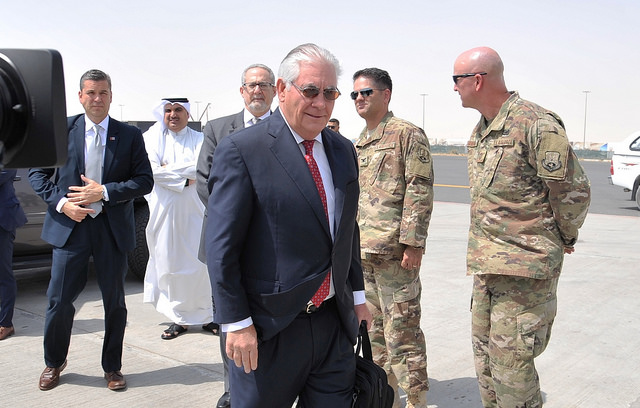by Emile Nakhleh
Mohammad bin Salman’s (MbS) recent purge of his opponents in Saudi Arabia and his bellicose rhetoric toward Iran and Hezbollah threaten to plunge the region into more destructive military clashes. MbS’s bellicosity toward Iran and other state and non-state regional actors is being pursued against the backdrop of the Saudi disastrous war in Yemen, a bloody conflict in Syria, and the unraveling of Iraq. Although MbS seems to be operating with President Donald Trump’s blessing, the Saudi rhetorical belligerence poses a serious threat to the region’s stability and to American interests and personnel in the Middle East and the Eastern Mediterranean.
Immediately following the palace purge, President Trump tweeted his support for the action and expressed “great confidence” in the Saudi leaders. MbS’s close relations with Trump and his son-in-law Jared Kushner will likely backfire. Trump’s knee-jerk support for MbS’s autocratic crackdown doesn’t reflect deep knowledge of the region or strategic considerations of its future. Nor does it signal an expert understanding of unintended consequences.
Even more troubling is that Secretary of State Rex Tillerson, unlike his predecessors, is totally disengaged from these momentous developments. His vanishing act shows a dangerous disregard of what’s happening in the region and signals to the peoples and leaders of the Middle East that Washington is no longer concerned about that part of the world.
Arab autocrats and budding dictators, like MbS and Abdel Fattah al-Sisi of Egypt, feel empowered to pursue their deadly power grab games, domestically and regionally, with apparent disregard for the United States or the Trump administration’s possible reaction to these actions. Thanks to Tillerson and Trump, the marginalization of American diplomacy in Middle Eastern affairs has become an established fact.
Although the Saudi purge has captured the headlines, the danger of a regional war, domestic upheavals, and regime change is more likely than at any time in recent memory. As MbS consolidates his power domestically against influential members of the Al Saud ruling family, he is using anti-Shia sectarianism to whip up war hysteria against Iran and the Iran nuclear deal.
By forcing pro-Saudi Sunni Lebanese Prime Minister Saad al-Hariri to resign, ostensibly because of perceived Hezbollah political machinations, MbS seems to be widening the road toward a military confrontation with Iran. His claim that tiny Lebanon is declaring war on Saudi Arabia is patently absurd. He seems to believe that regionalizing the conflict might enhance the veracity of his claims. Washington, Tel Aviv, and Abu Dhabi might be happy with the Saudi anti-Iran hysteria in the short term, but a Saudi-Iranian war and the possible scuttling of the Iran nuclear deal would be disastrous for the region, for Saudi Arabia, and for the United States.
Hariri claimed, without convincing evidence, that the actions of Iran and Hezbollah prompted his resignation, which he announced from a hideout in Riyadh. Yet, some of his staunch Sunni supporters in Lebanon didn’t believe his trumped-up charges against the two Shia actors. Many in the region believe that MbS is using Lebanon as a pawn in a deadly chess game against Iran, which he will likely lose.
Instead of cheering on the young Saudi crown prince, the Trump administration should curtail his unbridled ambitions and prevent him from plunging the region in yet another deadly military confrontation. By siding with MbS, the Trump administration shows that it has not learned any useful lessons from the Iraq war and the terrible instability and human tragedy that followed the demise of the Saddam regime in 2003. Nor has the Trump administration understood the impact of hundreds of thousands of war refugees on Europe and elsewhere.
Failing American Diplomacy in the Trump Era
American secretaries of state over more than half a century have articulated and guided American foreign policy in the Middle East. They crisscrossed the region through war and peace to validate critical policy decisions and sell them to regional leaders. They helped form alliances and coalitions to serve American national interests, protect the strategic waterways, defend the region against foreign intruders—states and non-state actors alike—preserve regional stability, and resolve regional conflicts. Regional leaders accepted the secretaries of state as credible interlocutors and a reassuring face of the United States.
American diplomacy in the Middle East in the pre-Trump era has been characterized by constancy, predictability, flexibility, coalition-building, engagement, and a continuous balancing of values and interests. Secretaries of state from John Foster Dulles during the 1956 Suez War and Henry Kissinger in the aftermath of the 1973 War to James Baker following the Iraqi invasion of Kuwait in 1990 and John Kerry’s signing of the Iran nuclear deal in 2015 have always played a pivotal role in resolving conflicts and maintaining regional stability.
By abandoning this central role, current Secretary of State Rex Tillerson has dealt a serious blow to American prestige in the region and left Arab and non-Arab leaders pondering the future dependability of the United States. Under Trump and Tillerson, the traditional principles of American diplomacy have been replaced by improvisation and vacillation, a lack of a comprehensive strategy, impetuous remarks and tweets, contradictory statements, and a loss of credibility and leadership. The president has undercut the Department of State and made a concerted effort to eviscerate the Iran deal. Regional leaders and opinion makers believe that Washington has replaced strategic policy formulation with a series of ad hoc decisions that are puzzling, indefensible, and devoid of empathy for the peoples of the region.
The American presidency and diplomacy have diminished under Trump and Tillerson. Arab autocrats have come to view Washington as a source of cash and sophisticated weapons but lacking in the core principles that have defined the greatness of America over the decades. It’s a telling commentary on the demise of the “American century” in a region that has known nothing but turmoil and war. As long as regional conflicts continue—from the wars in Yemen and Syria to the Saudi tribal feud with Qatar—American arms manufacturers and the “military industrial complex” will continue to reap untold profits, and the peoples of the region will continue to suffer. Strong-arm leaders will find in Trump a kindred spirit, and Tillerson will remain on the sidelines.
A Path Forward?
It’s not rocket science to suggest that Washington needs to devise a clear and well-articulated strategy for the Middle East. The United States is present in almost every country in the region—militarily, diplomatically, economically, and culturally. If Tillerson is uninterested in studying how his predecessors in the past half-century conducted a high-level, engaging, and successful foreign policy toward the region, he should resign the office and go back to his old company. He has unfortunately discovered that running Exxon-Mobil did not prepare him to manage the foreign policy of the world’s sole superpower.
The new secretary of state must reassert American values of good governance and human rights and speak out against repression. Although Washington is disinclined to interfere in the internal affairs of other countries, it should not stand idly by while entrenched and aspiring dictators trample over the most basic rights of dignity and decency.
If the Trump administration is interested in regaining a semblance of respectability and credibility in the region, it must engage with law-abiding governments and communities. Early-morning tweets and rumored clandestine deals between Kushner and MbS are no substitute for deliberate, thoughtful diplomacy. On the contrary, these deals should sound an alarm before the Trump White House finds itself in more turmoil. Recent history teaches us that continued regional domestic power struggle, tribal feuds, regime change, and abject misery do not serve the long-term interests of the United States and its allies.
As a former senior CIA analyst, I wonder what drives this unusual Kushner-MbS arrangement. Is the MbS power grab and the anti-Iran campaign a pre-cooked political, military, financial deal with the Trump White House through Kushner? What benefits will Trump and his family reap from the royal crackdown in Riyadh and the stoking of war with Iran? What did MbS offer the Trump organization in return for the unqualified support he has received from Trump and his son-in-law?
Photo: Rex Tillerson leaving Kuwait City in July 2017 (State Department via Flickr).






As an expert analyst on the Middle East you should know the strategist behind the US foreign policy towards Iran is not Trump or Tillerson or the Saudi; it is the CIA. Also, the Arab rulers’ bombastic verbosity towards a ‘more powerful’ enemy they fear to confront (Iran) is ‘cultural’/a ‘tribal’ empty rhetoric that lacks action unless there is a Western/American military leading the barbaric assault.
Also, your views, that Tillerson “must reassert American values of good governance and human rights and speak out against repression” – coming from a CIA analyst – is equally astonishing! Since when have defending ‘human rights’ and condemning ‘repression’ in the Middle East been characteristics of ‘American values’?! Possibly since 19 August 1953!
You then add: “Although Washington is disinclined to interfere in the internal affairs of other countries, it should not stand idly by while entrenched and aspiring dictators trample over the most basic rights of dignity and decency.” What a grand statement, Dr. Nakhleh; a brave refutation of the historic narratives of the Middle East, South America, Africa, South East Asia, and many other regions whose vile, monstrous American backed dictators and their unprecedented atrocities left millions dead and traumatized!
I wonder what drives a senior analyst like you to make such a mind-blowing grand analysis of the mutilated body of the Middle East that for decades the stench of its bleeding corpse has drawn the attention of millions of ordinary people and countless academics and analysts to the ‘main’ causes and the perpetrators of its tragedy yet they have escaped the attention of a senior Director of the Political Islam Strategic Analysis Program at the CIA.
Much analysis, such as that of Emile Nakhleh, tends to be to “the choir” – professionals of bureaucracies, or those in think tanks, or academia – sources who feed the media, who’s imaginings control the narrative of opposing political parties, who strum the emotions of the voting hoi poloi. The latter, bedrock of a functioning democracy, are titillated by emotions, basically fears, anger, even love, associated with learned responses along lines of race, religion, sex, and envy. The illusive practice of “democracy” skids along entoning values of individual freedom that custom, and governments regulate, or control. The game of govenance, to an observer, can resemble Badminton, with a shuttlecock being batted about, chess played by experts, or a Quaker meeting with a sense of community committed to voluntary cooperation, and respect. Decisions, and direction, however, turn out to be more accidental, than intellectual. All the above suggests that the article presented is likely more speculative intellectual entertainment, than reality and foresight.
“…the Trump administration shows that it has not learned any useful lessons from the Iraq war and the terrible instability and human tragedy that followed the demise of the Saddam regime in 2003.”
That along with a delusional portrayal of the United States as some kind of force for good and the great protector of human rights speaks of your cognitive dissonance, Emile.That’s what happens to people when their political agendas are built upon a foundation of lies. For your own well being, you might want to get that sorted out.
There would have been no Islamic revolution, followed by fanatical repression, in Iran, without the US & UK overthrowing of Mossadegh. There would be no KSA billionaires looting the oil wealth, at the expense of the rest of Saudi citizens, without western machinations. You mentioned the disaster in Iraq – another production of the benevolent human rights champions in Washington DC. How do you square you correct assessment on Iraq with such nonsense about the good ole USA? You mentioned “refugees” and the effect on Europe, also due due to demonic western agendas which Arab players only took advantage of. Libya, formerly the wealthiest country in Africa is now the jumping off point for boatloads of Africans invading Europe with the assistance of the EU and NGO Marxists – all working to destroy western Christian civilization. The brutal murder of Gaddafi was also facilitated by the US who gave jihadists his satellite phone GPS location. Remember how the benevolent Hillary Clinton laughed at that atrocity? Her words: “We came, we saw, he died, haha!”. From another direction come boatloads and walking hoards from Turkey as a result of the evil actions of the champions of humans rights & and their Arab partners in crime, along with megalomaniac Erdogan, waging a jihadi proxy war against the secular government of Syria, the biggest middle east catastrophe of all. To try to frame US foreign policy as good for anyone and beneficial to “human rights” is a monstrous lie.
Trump and kabbalist Kushner’s games with the Saudis can easily be summed up: Zionism. Whatever benefits Israel and whatever Israel wants. You can bet your ass that a secret player in what’s going on is Benjamin Netanyahu.
Actually Bush tried very hard to get a war started against the Iranians. It culminated in 2006 with the British Sailor incident which was preceded by over a year of war propaganda along the lines of the Iraq war invasion propaganda. Most importantly, Bush accused the Iranians of being the main killer of US GIs, and of manufacturing super sophisticated IEDs for the purpose of killing US GIs. The PNAC document, so-called “Rebuilding” Americas Defenses, spoke of the proposed 2nd Pearl Harbor, being used to justify the proposed Iraq war, which would then itself be a stepping stone to the proposed invasion of Syria, which would then be a stepping stone to invade Iran. Even in 2006, the Iran invasion was already behind schedule.
And we can not know how bad their motivations are.
Personally, I think the idea of a major world war with a lot of blowback and terrorism and confusion, would be the perfect way to protect the billionaires from the rising tide of Democracy – not just in the short term but for 100s of years! They’re nihilists! It’s all the keep wages down, and so the worthless rich can get the rights of Lords again.
This is the new era. The old diplomacy looked rational, but it was anything but. It was headed for WW3. I suggest we watch and learn. The old diplomacy was an arm of the deep state. Trump’s team is not with the deep state.
The world is being shaken apart as it was sick and perverted. I am not sharing in the opinion of the author. American diplomacy has not benefitted Americans. Lockheed, Israel, politicians – they benefitted.
The old system is run by sick perverts. They are being let go. Bushes, Clintons and Obo are dustbin failures. Watch the new crew do less and get more for America. I know. To you I make no sense. Everything we have done thus far in the past was sowing the seeds of our demise. You will see.